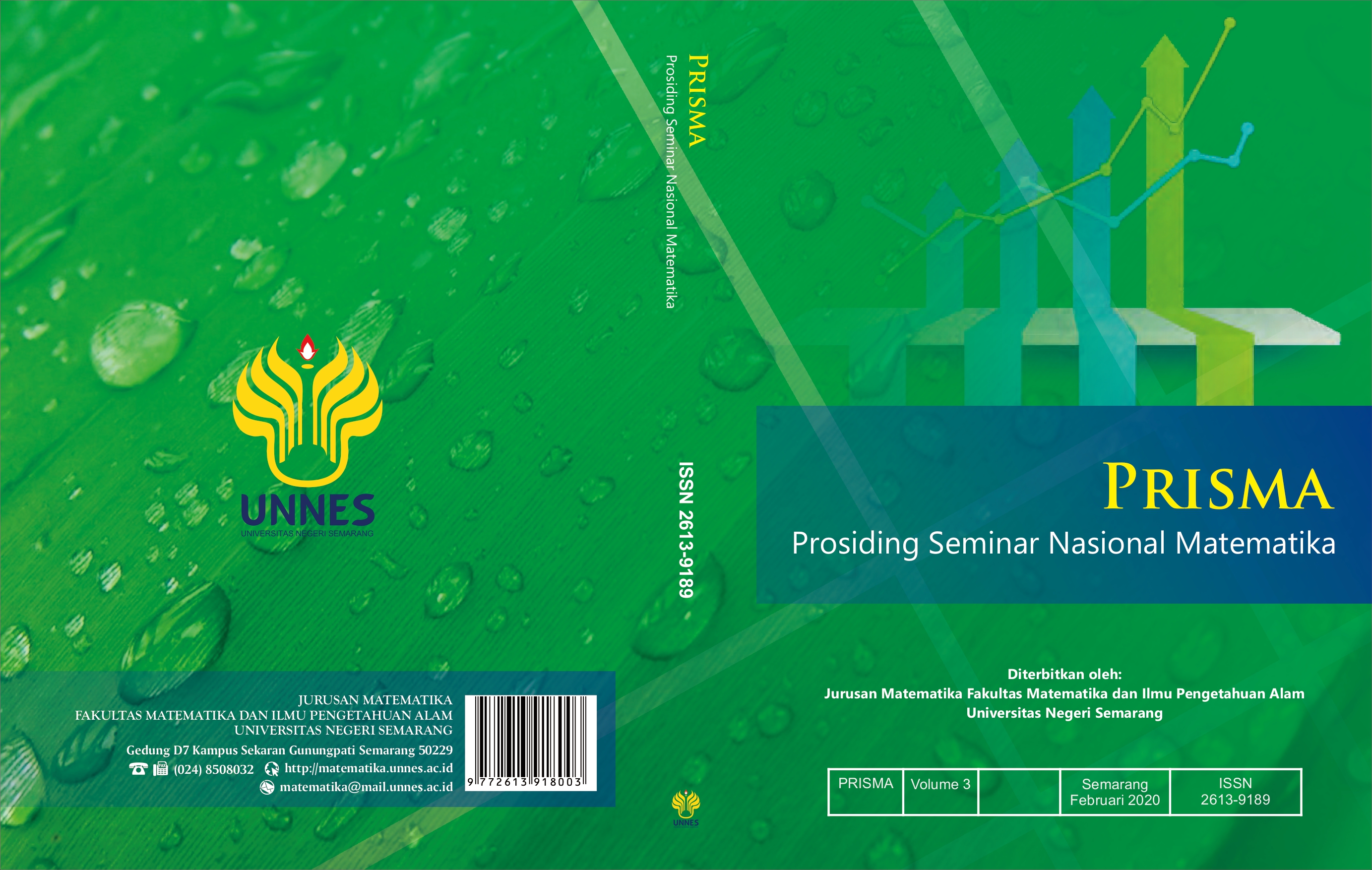Algebraic Thinking Ability Viewed From Students’ Interest Learning In Cooperative Integrated Reading and Composition (Circ) With Realistic Approach
Main Article Content
Abstract
The purpose of this study was to determine the algebraic thinking ability viewed from students’ interest learning in Cooperative Integrated Reading and Composition (CIRC) with realistic approach.
The method used in this study was a quantitative method with the Posttest Only Control Design. The population was class X1 students in one of Senior High School in Pati academic year 2018/2019. Technique of sampling by using cluster random sampling, obtained XI MIPA 5 class as the experimental class and XI MIPA 6 class as the control class. The technique of collecting data used tests, questionnaires, and interviews. The data was analyzed by using proportion test and t-test.
The results showed that (1) the algebraic thinking ability of students who get CIRC learning with a realistic approach achieved classical learning completeness, (2) the algebraic thinking ability of students who get CIRC learning models with realistic approach were better than algebraic thinking ability of students who get Discovery Learning, (3) students with upper interest learning tend to be able to fulfill generalization, transformational, and global meta-level activities, students with middle interest learning tend to be able to perform generational and transformational activities, but still tend difficult in conducting level-meta global activities, students with lower interest in learning tend to be able to do generational activities, but still tend difficult in carrying out transformational activities and level-meta global.
Article Details
References
Ahmad, A. K. 2017. The Effectiveness of the Implementation of Cooperative Learning Model of Team Games Tournament (TGT) Type with Realistic Mathematics Approach to Class VII Students at SMPN 1 Patampanua Pinrang District. Tesis. Konsentrasi Pendidikan Matematika. Universitas Negeri Makassar.
Cai, J., & Knuth, E.J. 2005. The Development of Students’ Algebraic Thinking in Earlier Grades from Curricular, Instructional and Learning Perspectives’. ZDM. 37(1). 1-4.
Dewi, R., Elhefni, E., & Testiana, G. (2017). Pengaruh Model Pembelajaran CIRC terhadap Kemampuan Menyelesaikan Soal Cerita Materi SLDV Kelas VIII. Jurnal Pendidikan Matematika RAFA, 3(1), 82-102. Retrieved from http://jurnal.radenfatah.ac.id/index.php/jpmrafa/article/view/1443.
Girit, D., & Akyuz, D. 2015. Algebraic Thinking in Middle School Students at Different Grades: Conceptions about Generalization of Patterns. Education Electric Journal Science and Mathematics Education. 10(2). 243-272.
Jin, H., & Wong, K. Y. 2014. Mapping Conceptual Understanding of Algebraic Concepts: an Exploratory Investigation Involving Grade 8 Chinese Students. International Journal of Science and Mathematics Education.
Lestari, K.E & Yudhanegara, M. R. 2015. Penelitian Pendidikan Matematika. Bandung: PT Refika Aditama.
Maudy, S. Y., Didi, S., & Endang, M. 2018. Student’ Algebraic Thinking Level. International Journal of Information and Education Technology. 8(9). 672-676.
NCTM. 2000. Principles and Standards for School Mathematics. United States of America: The National Council of Teacher of Mathematics, Inc.
Nurlaeli, T., Agoestanto, A., & Mashuri. 2018. The Analysis of Algebraic Thinking Ability of 7^{th}Grade Students on SQ4R Models Reviewed from Student’s Self Regulated Learning. UNNES Journal of Mathematics Education.
Ruhyana. 2016. Analisis Kesulitan Siswa dalam Pemecahan Masalah Matematika. Jurnal Computech & Bisnis. 10(2). 106-118.
Sari, D. P., & Fiantika, F. R. 2017. Proses Berpikir Aljabar dalam Penyelesaian Masalah Matematika Pokok Bahasan Fungsi pada Siswa Kemampuan Sedang ditinjau dari Kemampuan Representasi. Prosiding Seminar Nasional Matematika dan Pembelajarannya. Malang: 25 November 2017.
Setyaningrum, R. R., Chotim, M., & Mashuri. 2012. Keefektifan Model Pembelajaran Kooperatif Tipe CIRC dan NHT dengan Pemodelan Matematika dalam Menyelesaikan Soal Cerita Kelas VIII. UNNES Journal of Mathematics Education. 1(2). 36-42.
Slameto. 2010. Belajar dan Faktor-faktor yang Mempengaruhinya. Jakarta: Bina Aksara.
Slavin, R. E. 1985. An Introduction to Cooperative Learning Research. Springer Science.
Sugiyono. 2015. Metode Penelitian Kuantitatif, Kualitatif, dan R&D. Bandung: Alfabeta.
Suyitno, A. 2005. Mengadopsi Pembelajaran Cooperative Learning tipe CIRC (Cooperative Integrated Reading and CompositionI) dalam Meningkatkan Keterampilan Siswa Menyelesaikan Soal Cerita. Makalah Seminar Nasional UNNES. Semarang: Universitas Negeri Semarang.
Tagle, J., Belecina, R. R., & Ocampo, J. M. 2016. Developing Algebraic Thinking Ability among Gradw Three Pupils through Pictorial Models. International Journal for Education Studies. 8(2). 147-158.
Yueni, D. R. 2018. Diagnosis Kesulitan Belajar Matematika Materi Operasi Aljabar pada Siswa SMP Kelas VII. Simki-Techsain. 2(6).
